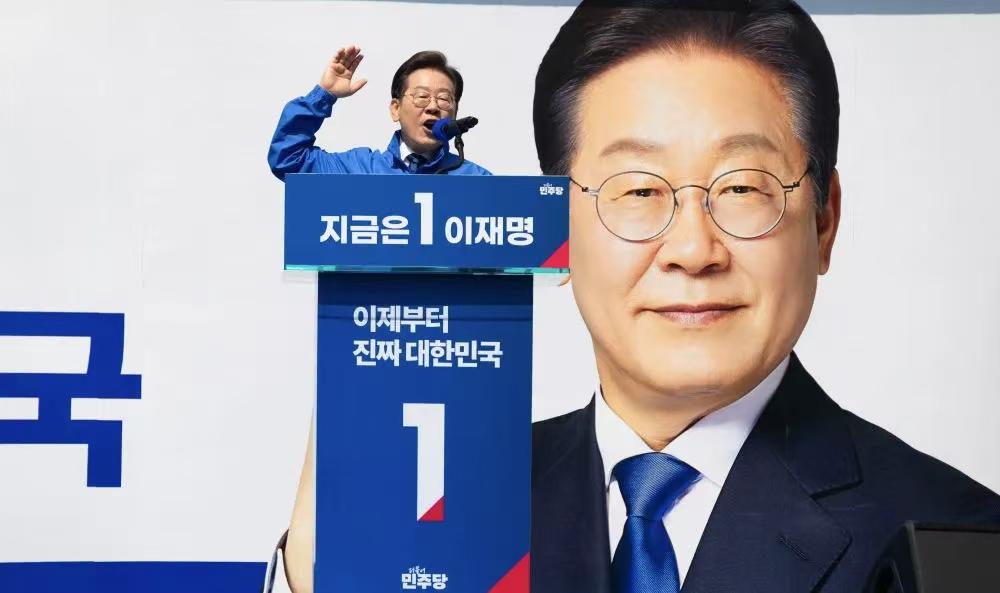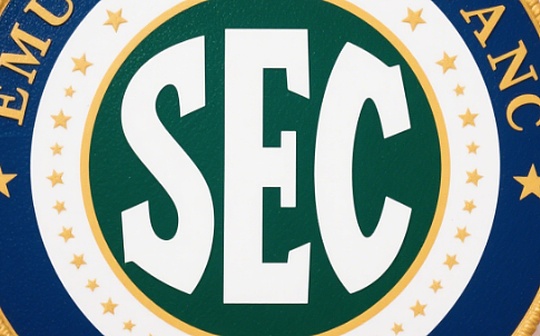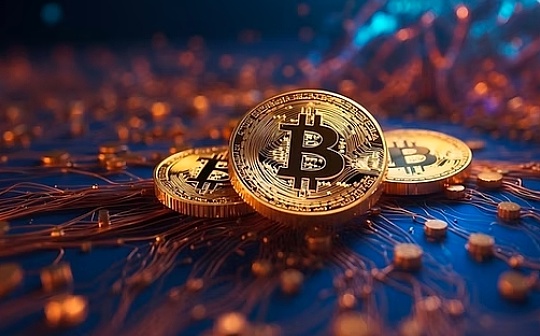Video | Weekly Market Interpretation: New breakthroughs in Sino-US trade, impact on the New Taiwan dollar and shifts in South Korea's ETF policy, where does global capital flow?

Reprinted from panewslab
05/13/2025·1MOriginal text: The Round Trip
Compiled by: Yuliya, PANews
In an era of crypto and AI, stories that really matter are often hidden outside the hustle and bustle. To find these neglected truths, PANONY and Web3.com Ventures jointly launched the English video program "The Round Trip". Hosted by John Scianna and Cassidy Huang, this episode will provide readers with comprehensive market insights from the current key trends in the global market, from the India-Pakistan conflict to cryptocurrency breakthroughs, from Sino-US trade negotiations to global monetary policy differentiation.

Token2049 Dubai scene: The popularity rekinds its revival of construction
emotions
Token2049 Dubai has a high flow of people, the exchange made a high-profile appearance, and there are many high-quality projects. The heavy rainstorms that plagued the event last year did not reappear, and the overall experience improved significantly. Market sentiment has rebounded significantly, and the project party has returned to the "construction model", demonstrating its beliefs and vision.
However, the sideline activities are too dense, and Dubai's traffic congestion often takes 30 to 40 minutes to shuttle between the activities. Despite this, the execution and long-term thinking of some founders is still impressive. In addition, there is an interesting episode: the world is in trouble with a "pistasis shortage", partly because of the popular pistachio chocolate in Dubai. It is reported that this chocolate is available on Costco and its price has risen from $7 to $10, while the ones native to Dubai are even more expensive to $20 per piece.

Geopolitical storm: India-Pakistan conflict escalates
The most serious incident that attracted the most attention last week was the escalation of tensions in India and Pakistan. The roots of the conflict can be traced back to the partition of British India in 1947, and four major wars have erupted from the two countries: the Kashmir War of 1947-48, the Second Kashmir War in 1965, the Bangladesh Liberation War in 1971, and the Kagir War in 1999. It is worth noting that since 1998, India and Pakistan have become nuclear-weapon countries, making any conflict more serious potential consequences.
The tensions stemmed from a terrorist attack in Indian-controlled Kashmir on April 22, killing 26 tourists (mostly Hindus). The attack was claimed by the Resistance Front, which is linked to the "LeT" which planned the 2001 Indian Parliamentary attack and the 2008 Mumbai terrorist attack. India immediately accused Pakistan of protecting terrorists.
Earlier last week, India launched a military operation code-named Operation Sindoor, hitting nine targets in Pakistan-controlled Kashmir. India emphasized that this is a precise strike against terrorist infrastructure and avoids Pakistan's military targets. However, Pakistan condemned it as an "act of war", reported casualties of civilians, including women and children, and claimed that it had shot down Indian fighter jets and carried out retaliatory strikes.
The conflict continued to escalate, and the two sides exchanged fire near the Line of Actual Control (LOC), resulting in the evacuation of a large number of civilians. China, as a close ally of Pakistan, expressed serious concern, and Western intelligence even reported that China's J-10 fighter jets shot down India's legal "Ravel" fighter jets. The international community, including UN Secretary-General Guterres and US President Trump, both called on all parties to restrain themselves, but under the promotion of populist leaders such as Modi, it is difficult for both sides to give in without "victory".
Macroeconomic policy differentiation: global liquidity and interest rate
trends
Global macroeconomic policies are showing obvious differentiation. The People's Bank of China lowered the deposit reserve ratio, injecting US$143 billion into the system, and opening up the liquidity release model. It is unclear whether this is a liquidity injection in the context of the trade war or a quiet panic in the market. Meanwhile, OPEC members agreed to increase production despite lower oil prices, a decision that could be intended to stimulate global economic growth.
On the US, Federal Reserve Chairman Powell kept interest rates unchanged between 4.25% and 4.5% with negative GDP in the first quarter. Whether inflation is controlled/whether economic growth is sacrificed remains to be observed. By contrast, the UK chose to lower interest rates to 4.25%, demonstrating a different monetary policy path.
In addition, U.S. President Trump reached a trade deal with the UK, the first formal agreement since Trump launched a global tariff offensive. The two sides agreed to lower trade barriers for automobiles, agriculture and steel, with the United States reducing tariffs on British steel from 25% to 0% and automobile tariffs from 27.5% to 10%. In exchange, the UK will relax access to American automobiles, ethanol, agricultural products and industrial equipment. The agreement provides targeted tariff reductions, but is still far from a comprehensive trade agreement, more like the first step in the long-term negotiation process.
Chip Diplomacy and AI Strategy Turn
Interestingly, the Trump administration hinted last week that it might revoke or not implement the Biden-era AI proliferation framework. The framework aims to control the global distribution of U.S. AI chips by dividing the country into three levels, and implementing export caps for even long-term allies, with implementation going into effect on May 15.
This transformation is very strategic and can be used as a bargaining chip for trade negotiations. For example, second-tier countries such as Israel, India and Switzerland are purchasing US F-35 fighter jets, but are facing restrictions on purchasing Nvidia chips. This contradiction is: do you trust them to use your most advanced stealth fighter, but you don't trust them to use GPUs? This strategic shift shows that the current government plans to use AI chip exports as a tool for trade negotiations rather than implementing comprehensive restrictions. By giving allies greater access, U.S. companies such as Nvidia and AMD can expand their markets, increase profits and reinvest them in next-generation hardware, ensuring the U.S. remains technologically superior.
This is not only about trade and economy, but also about strategic driving force. Restrictions may backfire and inspire innovation. Taking Tencent as an example, in order to deal with chip restrictions, they developed the Hunyuan Turbo S, an ultra-efficient AI model that can reply to queries in less than a second, combining Mamba and Transformer elements. They also launched the Hunyuan T1, which uses an expert hybrid system for event reasoning and problem solving. As the saying goes, "Demand is the mother of invention."
At last week's ICLR conference, OpenAI, Google DeepMind, and universities from the United States, China and around the world all sent representatives to present their research results. China has a large number of students and business representatives, and they emphasize that their models use less memory. China is not waiting to gain access, but innovates out of necessity. If the United States imposes excessive restrictions, it can only temporarily slow down the development of these countries, but may inadvertently accelerate their progress. Therefore, changing this policy is not a manifestation of weakness, but a move towards strategic clarity.
Taiwan's new Taiwan dollar changes and capital flow
The market has responded to this, with the NTD soaring more than 10% in just two trading days, the most violent volatility since the 1980s. A large amount of foreign capital flowed into the Taiwan stock market, especially in the semiconductor field. Taiwan chose not to intervene and conveyed a signal that the New Taiwan dollar would appreciate. However, the appreciation of the New Taiwan dollar will hurt exports, and Taiwan's economy is extremely dependent on exports. Other Asian currencies have also fluctuated, and traders predict that other central banks may take similar actions. Analysts have different opinions, some believe that the New Taiwan dollar will continue to appreciate, while others predict that it will pull back soon. The rise in the NTD is due to the AI boom and the influx of foreign capital, but there are hidden risks behind it. Once export data is damaged, the policy may be adjusted accordingly.
New progress in Sino-US trade negotiations

On May 12, China and the United States issued a joint statement after the economic and trade talks held in Geneva, announcing adjustments to some tariffs. According to the statement, the United States will cancel the 91% tariff increase and suspend the 24% "reciprocal tariff" of 90 days. Currently, the "reciprocal tariff" on China has been reduced to 10%. China has also canceled and suspended some countermeasures accordingly. The negotiations mainly focus on tariff reductions and do not involve tariffs imposed by the United States on the grounds of fentanyl and some countermeasures from China. China and the United States also agreed to establish a mechanism to continue to negotiate on economic and trade relations to resolve differences through institutionalized communication mechanisms. The Ministry of Commerce said that the ultimate goal is to completely correct the mistake of unilateral tax increase, continue to strengthen mutually beneficial cooperation, and maintain the healthy, stable and sustainable development of China-US economic and trade relations.
Since the U.S.-China trade war, it has had a substantial impact on both sides' economies: rising costs of US companies, passing them on to consumers, resulting in price increases and supply chain delays; Chinese factory activity slowed down and exports fell. Beijing responded with interest rate cuts, capital injections and a series of stimulus measures, but the chain reaction of the trade war has surpassed tariffs itself and affected global trade stability.
Bitcoin Enterprise Trend: From Strategy to MetaPlanet
Bitcoin has recently exceeded the $100,000 mark and is currently trading at around $101,000, reflecting the market's enthusiasm for crypto assets. The trend of corporate holdings in Bitcoin continues to strengthen:
-
Strategy (formerly MicroStrategy) held the 5th "Company Bitcoin Conference" in Florida, and CEO Michael Saylor emphasized the importance of Bitcoin as a corporate reserve asset. At the meeting, it was announced that it would purchase another 1,895 bitcoins, with a cumulative holding of 555,450 pieces, continuing to maintain its position as the world's largest corporate bitcoin holder.
-
Tokyo-listed company MetaPlanet also purchased 555 bitcoins last week, bringing the total holdings to 5,555. This number is symbolic in Japanese because "5" is pronounced as "Go", and 5-5-5-5 symbolizes "Go! Go! Go!" (心!). The purchase was worth about $53 million, and the company's share price subsequently rose 13%. MetaPlanet has become Asia's largest listed Bitcoin holding company, ranking 11th in the world, with the goal of holding 10,000 Bitcoins by the end of the year.
-
David Bailey, CEO of Bitcoin Magazine and MetaPlanet Consultant, announced the establishment of " Nakamoto ", focusing on Bitcoin media, mining and infrastructure construction, aiming to acquire troubled Bitcoin companies and restart their assets. It is backed by institutional and sovereign funding, which is said to mobilize billions of dollars of capital.
Crypto Policy Observation: South Korean ETFs Turn to Diverge from Reserve
Attitudes in Various Countries
The 21st presidential election in South Korea will be held on June 3, 2025, and the presidential election campaign will be officially launched on May 12, and the seven candidates will launch a fierce 22-day canvassing battle. Lee Jae-ming of the Democratic Party led the polls and was named No. 1 candidate. His main opponent was Kim Moon-soo of the ruling National Power Party, who was No. 2 candidate.

Left-wing Democratic candidate Lee Jae-ming and right-wing party candidate Kim Moon-soo both promised to promote the legalization of Bitcoin ETFs to form a rare cross-party consensus. This policy aims to promote the accumulation of middle-class wealth and provide more opportunities for the younger generation. Kim Byung-hwan, chairman of the Financial Services Commission (FSC), expressed his willingness to discuss implementation plans with the new government, marking a major change in policy attitudes. FSC has previously clearly opposed spot crypto ETFs, believing that their volatility is too high. The success of US spot crypto ETFs (net inflows exceeding $43 billion) has become a key factor in South Korea's re-examination of such products.
Meanwhile, some U.S. states are gradually accepting Bitcoin: New Hampshire has approved legislation that allows states to invest up to 5% of public funds in Bitcoin, while Arizona allows unclaimed digital assets to be used for pledge or earn rewards before transferring them to reserve funds.
However, Florida withdraws its Bitcoin Strategic Reserves Act, while UK Finance Minister Emma Reynolds made it clear that Bitcoin’s volatility makes it unsuitable as a public reserve of funds. Similarly, countries such as Japan, Switzerland and Russia have also ruled out Bitcoin reserves, emphasizing the importance of stability in public fiscal management.



 jinse
jinse
